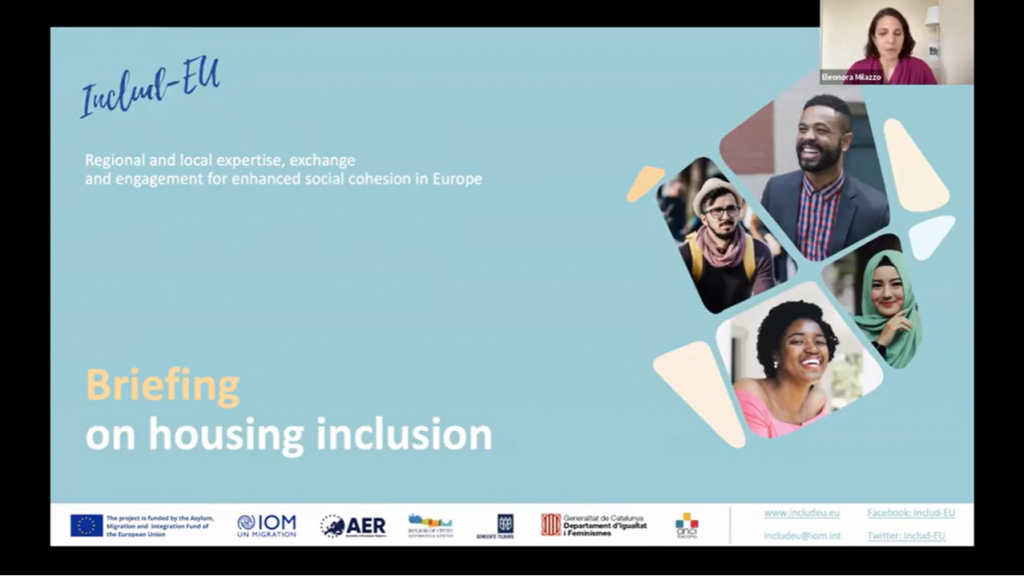News
Inclusive Housing: why and how?
Main findings and good practices from the 4th Includ-EU webinar

Access to adequate and affordable housing is a key determinant of successful integration. Housing conditions have a strong impact on employment and education opportunities and on the interactions between migrants and host communities. Poor housing conditions and segregation can exacerbate divisions, which undermine social cohesion. Inclusive housing is therefore essential for thriving neighbourhoods.
The need for cross-sectoral approaches
The 4th Includ-EU webinar on cross-sectoral approaches to inclusive housing looked at practices that promote the benefits of intercultural identities of neighbourhoods. Encouraging social interactions via holistic housing policies and reinventing public spaces is of utmost importance to foster integration.
Setting the framework
Rossella Celmi, Project Manager at the IOM Coordination Office for the Mediterranean, opened the webinar by reminding participants that “beyond its strictly material aspect, upholding the right to housing is considered crucial for human dignity and personal development, as well as a precondition for the enjoyment of other rights“.
With the war in Ukraine leading to new needs to welcome migrants, mainly women with children, Rossella Celmi shared an overview of the current situation, both in Ukraine, with high numbers of internally displaced persons, and in neighboring countries, as well as the IOM response in different countries.
See Rossella Celmi‘s presentation here
Looking at housing through an intercultural lens
Ivana D’Alessandro, Head of the Intercultural cities Unit, Council of Europe started off with the basic principles of intercultural cities: Integration is not only about rights, it is about:
- promoting real equality;
- building on the diversity advantage to create a “WE” culture based on shared values;
- fostering interaction within and between.
The intercultural model brings together the principles of Diversity, Equality and Interaction.

These three principles lead to a specific role for public space: social trust indeed builds across diversities in the public space. Urban planning is therefore fundamental for authorities that want to develop intercultural cities and regions. To harness the diversity advantage.
Gentrification, a process through which lower income residents are displaced from a neighbourhood due to an influx of new residents, resulting in a change of character of the neighbourhood, results in displacement, and change in social and urban character. Gentrification therefore has negative impacts on all three dimensions of interculturality: equality, diversity, and interaction. Ivana D’Alessandro cited Tom Slater Professor of Urban Geography, at the University of Edinburgh who calls gentrification “the special expression of economic inequality”.
She shared how the intercultural cities’ principles apply to the public space:

Applying these principles is then reflected in work on the rent gap and affordability, in the prevention of displacement, the strengthening of participatory processes, achieving inclusive public space and the promotion of sustainable tourism… which in turn will have an impact on rent etc.
See Ivana D’Alessandro‘s presentation here
Includ-EU briefing on Housing
Eleonora Milazzo, PhD, researcher and migration policy consultant at Kings College London shared the findings of the Includ-EU Briefing on Housing, which analysed the housing context for migrants in Greece, Italy, the Netherlands, Romania, Slovenia and Spain. The data lead to a series of recommendations:

The briefing also describes a series of local and regional examples in the 6 countries, which illustrate how these recommendations can be implemented.
In Includ-EU, sharing of examples is seen as an essential tool to improve policies and practices. Eleonora Milazzo‘s presentation is available here, and provides for instance details on:
- how the “A New House” initiative in Cluj-Napoca provides material and medical assistance to vulnerable families and individuals
- how Lucca’s House Agency in Tuscany matches supply and demand on the housing market
- how Slovenia provides additional housing support for beneficiaries of international protection
- and many other examples!
Unleash the potential of migration
Migration is a phenomenon that will remain and is likely to amplify in the future. In this context, rather than “solving” a “migration challenge”, sustainable policies and practices are focused on creating meaningful, equal to equal interactions between newcomers and local citizens. This in turn is deemed to enable cities and regions to benefit from the entrepreneurial spirit, variety of skills and creativity associated with cultural diversity.
Fatemeh Jailani, COO of SINGA Global, shared insights on SINGA’s “3 weapons of mass cohesion”, which are community organising, entrepreneurship and innovation.

The 7 steps methodology
This methodology ensures the relationship is mutually beneficial and not rooted in a saviour-victim pattern.
- Registration: aspiring hosts inform about motivation & space available
- Informational meeting: to explain the programme, methods of intercultural co-housing, check motivation
- Connection: based on location, motivation & expectations, areas of interest
- First meeting: in neutral place. Potentially a second meeting to visit
- Decision making: if both sides agree, then they have access to tools such as agreement, charter of cohabitation, intercultural training
- Follow-up: the ‘J’accueille’ team will check on cohabiations regularly.
- Facilitate communication: whenever there is a communication issue hosts and hostees can contact the team. A mediation service is available too.
While in emergency situations, the methodology may seem slow, results show that it is very effective and more sustainable than citizens hosting solutions without knowledgeable support. Safety is indeed a key aspect, both for hosts and hostees.
ANCI Toscana’s new model to tackle temporary housing needs
Watch the video of the webinar
Do you want to share your project with our community and stakeholders?